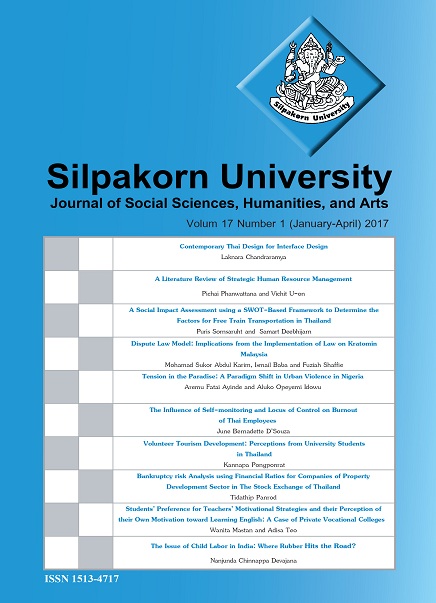Tension in the Paradise: A Paradigm Shift in Urban Violence in Nigeria
Main Article Content
Abstract
There had been a tremendous increase in the record of urban violence in the past decade and a clear tendency consistent increased. There is an average of ten (10) (reported) incidents of violence per day in each urban city in Nigeria regardless of it magnitude, an average of three hundred and fifty (350) crimes committed across the country per day regardless of it magnitude. This work reveals the effects of violence on development in Nigeria. The motive behind any group conversing for a right is seen as a collective bargaining for the public good. Conversely, this motive had dwindled down the lane taking a strange manoeuvrings and becoming a shift to personal aggrandizement and self glorifying egocentric motives. The Relative Deprivation theory is adopted in this work to effectively buttress the root cause of the problem of violence. This paper recommended institutional remedies and strengthened of internal democracy so as to ensure essential political, economical and social services for the citizenry and to mitigate religious bigotry, ethnic chauvinism and regional sentiments in the polity.
Downloads
Article Details
All rights reserved. Apart from citations for the purposes of research, private study, or criticism and review,no part of this publication may be reproduced, stored or transmitted in any other form without prior written permission by the publisher.
References
Adeleke, J. (2012) Violence and women participation in politics: A case study of Ekiti State, Nigeria. International Journal of Sociology and Anthropology 5(1): 26-34.
Adewale, R. (2005) Violence in the Citadel: The Menace of Secret Cults in the Nigerian Universities. Nordic Journal of African Studies 14(1): 79-98.
Alao O., Atere, O. and Olusegun, O. (2012) Boko-Haram Insurgence in Nigeria: The Challenges and Lessons. Singaporean Journal of Business Economics and Management Studies 1(4): 3-5.
Alemika, E. (2011) Post-Election Violence in Nigeria: Emerging Trend and Lessons. Lagos CLEEN Foundation Publication.
Aver, T., Nnorom, K. and Targba, A. (2013) Political Violence and its Effects on Social Development in Nigeria, International Journal of Humanities and Social Science 3(17): 262-265.
Aver, T. (2012) The Emergence of Boko Haram and Security Challenges in Nigeria, Journal of African Politics and Society, Anyigba 1(2):23.
Babangida, I. (2002) Ethnic Nationalities and the Nigerian State: The Dynamics and Challenges of Governance in a Plural Nigeria. Distinguished Annual Lecture, National Institute for Policy and Strategic Studies, Kuru, Nigeria.
Best, S. G. (2008) Ethnic and religious conflicts in Wase LGA, Plateau State, Nigeria. In Causes and Effects If Conflicts in the Southern Zone of Plateau State, Nigeria. Ibadan: John Archers Publishers Limited.
Crosby, F. (1976) A Model of Egoistical Relative Deprivation. Psychological Review : 83.
Diamond, L. (1994) The Military, Militariazation and Democratization in Africa: A Survey of Literature and Issues. African Studies Review 37(2).
Fan A., Jummai J. and Onuoha N. (2014) Towards Proffering a Solution to the Persistent Religious Intolerance Which Is a Bane of Development in Nigeria Global Advanced Research. Journal of Educational Research and Review 3(2): 22-27
Gurr, T. R. (1970) Why Men Rebel. Princeton, NJ: Princeton University Press.
Howell, R. (2004) Political Thuggery in Vogue. Chicago: L and T Press Ltd.
Idahosa, O. and Akov, E. (2013) Ethno-Religious Conflict and Peace Building in Nigeria: The Case of Jos. Plateau State Academic Journal of Interdisciplinary Studies 2(1): 349-350.
Kendall-Tackett, K. and Giacomoni, S. (2007) Intimate Partner Violence. Kingston, New Jersey 08528: Civic Research Institute.
Kwaja, C. (2009) Strategies for [Re] Building State Capacity to Manage Ethnic and Religious Conflict in Nigeria. The Journal of Pan African Studies 3(3): 106-108.
Kwanashie, M. (2003) Effect of Political Crises on Women: Towards the Management and Peaceful Resolution of Conflicts. In Politics and Political Power Relations in Nigeria : 9.
Martin, J. (1981) Relative Deprivation: A Theory of Distributive Injustice for an Era of Shrinking Resources. Research in Organizational Behavior 3: 53- 107.
Muggah, R. (2012) Researching the Urban Dilemma Baseline Survey. International Development Research Centre: Canada.
Nwanegbo, J., Odigbo, J. and Ochanja, N. (2014) Citizenship, Indigeneship and Settlership Crisis in Nigeria: Understanding the Dynamics of Wukari Crisis. Journal Research in Peace, Gender and Development (JRPGD) 4(1): 8-14.


